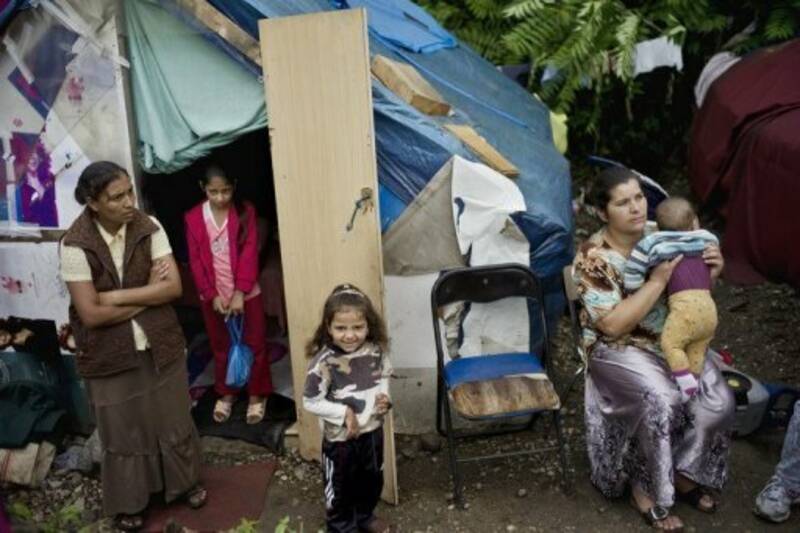
Members of the Roma community in a camp in Lyons, 2010
When, in 2007, the European Union opened its membership to Eastern European countries, it only left the door ajar. As Renault or other European corporations had welcomed the entrance of Eastern European countries into the Union, seeing the potential for reserve of cheap labor, the promise of a “we stand together European citizenry” of these new members did not apply to the Roma, who are European citizens. In eight European Countries including France, the Roma have been under work restrictions, with only 150 types of work or “métiers” opened to them. Moreover, an employer who would like to hire a Roma would have to pay a monthly 700€ (about $900) flat tax on salary, a huge deterrence to employment.
This summer, despite the recent formation of a French socialist government, which includes a few Europe Ecology ministers, under the presidency of François Hollande, the policies of removal of Roma camps from some sites in France, a practice started by Sarkozy and opposed at the time by one François Hollande, have been reenacted under the aegis of Manuel Valls, the minister of the interior.
These removals triggered a series of criticism, including from other members of the government such as Cecile Duflot (Europe Ecology) who pointed out the counterproductive nature of such actions that push already stigmatized population toward more precariousness.
Martine Aubry, socialist mayor of Lille, one of the cities where Roma were evicted, was reported to be furious at M. Valls for having engaged in this action without any consultation with her or her administration. She also emphasized that it was a serious breach in the work that her city has done to welcome the Roma. This work included construction of camps, with three more being built when the police dislodged the Roma from unofficial sites.
M.Valls claimed that the camps were unauthorized and therefore unlawful, adding that the law of the republic had to prevail. However, the laws have consistently ignored the reality of life for the Roma community and have targeted them as scapegoats by describing a surge of Roma population that would occur if they were to be `unleashed’.
The `surge’ of Roma in France amounts to 15 000 people. That number has remained stable for years despite the politics of expulsions, according to anthropologist Martin Oliviera, a member of the European Observatory Urban-Rom who works in a suburb of Paris. He adds that the Roma are not nomadic, as the cliché supports. He emphasized that their vocation is not to gush, or spill, westward “as if Europe was slanted.”
The politics of exclusion, on the other hand, are slanted. They are part of a capitalist framework that has evolved to a new neo liberal order that plays out to build (or to generate) the “vulnerable” that becomes the “filthy” as the politics of exclusion grows, and the French socialists are themselves entangled in this. The impediments to living and working for the Roma are in place. Unquestionably, various critics forced the government to make a gesture: the tax on salary was removed and the number of Métiers authorized increased. But it is too little and will not produce the real support that the Roma need.
So now, many are being rendered vulnerable under the same framework. Many are in the streets with no sense of belonging. This is not about charity for the Roma. It is about living in resistance to an order that we have allowed to be ours.
(Photo Credit: Libération / Jeff Pachoud / AFP)
